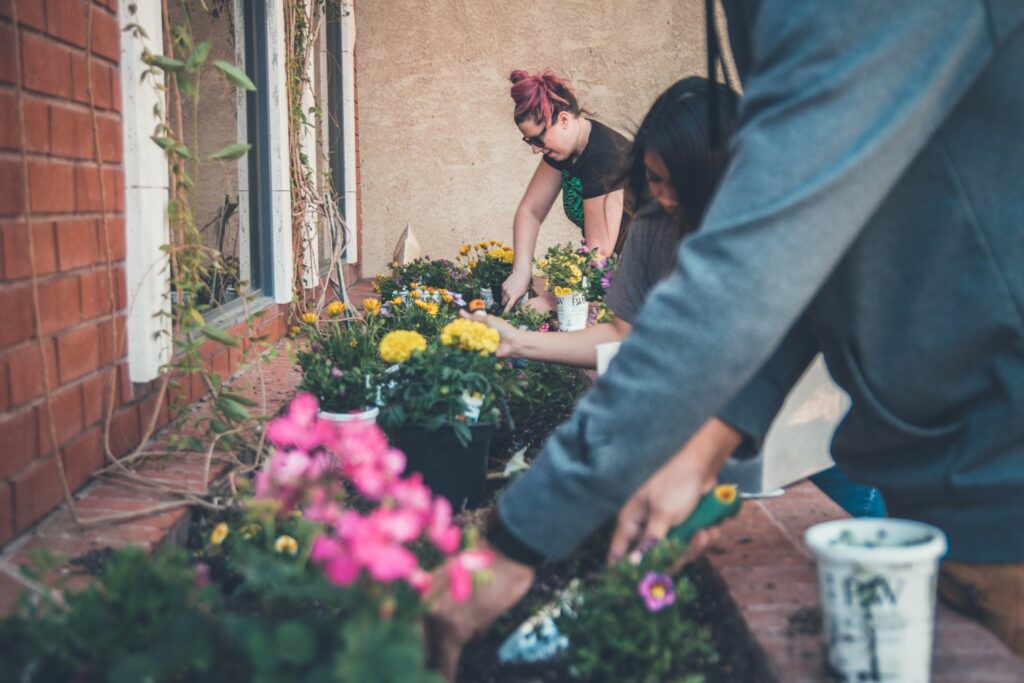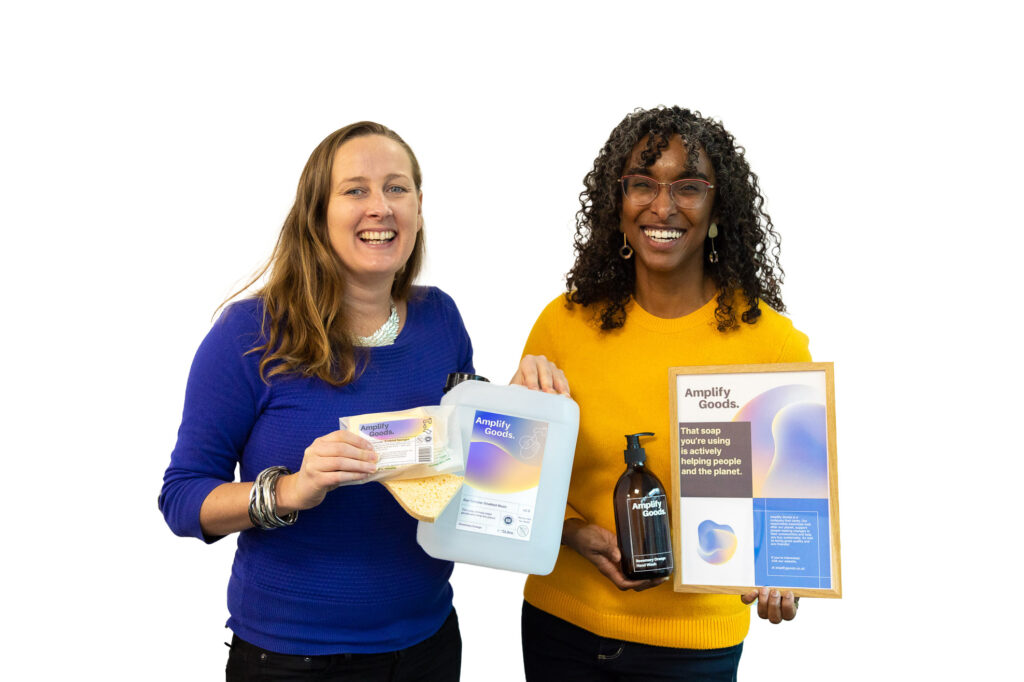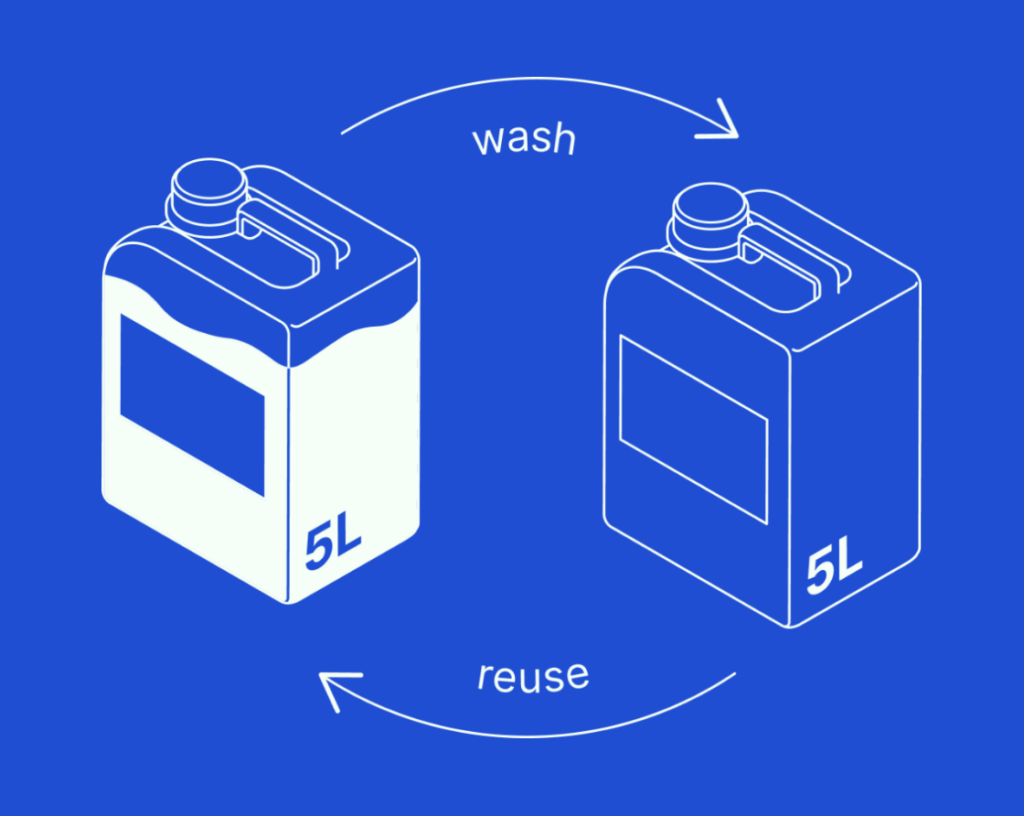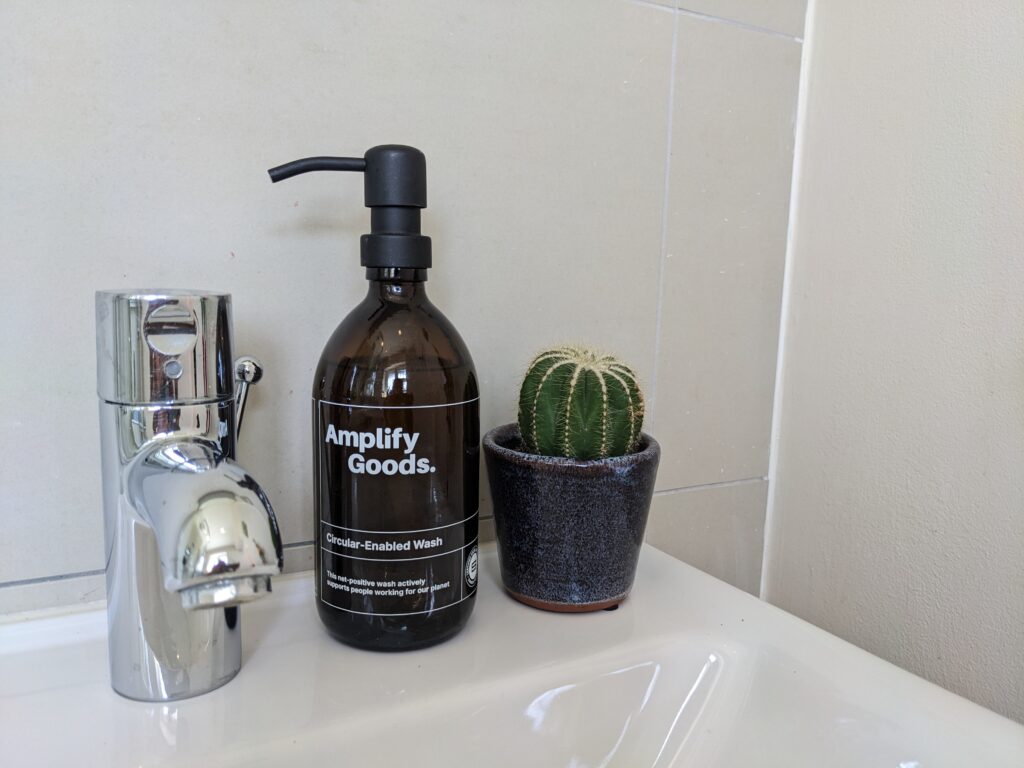Soaps, suds and social impact: Amplify Goods inspire you to clean up your act
6/7/2023
When you’re considering where you can create more social impact in the office, the bathroom may not cross your mind. But Amplify Goods is here to help you see the potential in your loos.
They create sustainable hygiene products of the highest quality, working with distributors to get their soap into bathrooms up and down the UK and Ireland. And they’re shaking up the white, male-dominated cleaning industry while they’re at it.
Eco values are embedded through every inch of the business. As you’d expect, this shows up in the ingredients and packaging. But beyond that, the Amplify Goods’ model commits to supporting the mental health and wellbeing of quiet changemakers. These are unsung heroes on the ground in UK communities putting their all into climate-related projects and at risk of burnout.

The risk of burnout in social impact jobs is something all too familiar to founder duo Pasha Michaelsen and Camilla Marcus-Dew. In this chat with Pasha, we discover how their own work backgrounds inspired them to build a people-first, collaborative biz that’s good for their own and others’ mental health. There’s heaps of inspiration for doing business more thoughtfully and amplifying social impact through procurement in their story.
Take us back to the beginning of Amplify Goods. What inspired you to start a social enterprise and what problem were you trying to solve?
I met my business partner, Camilla Marcus-Dew, back in 2015. We were both doing On Purpose – it’s kind of like a social enterprise MBA programme. During that time, we were like ‘we’re going to work together one day’. That was the seed.
Camilla went to work in a social enterprise creating employment for blind people, making soap and other hygiene products. I was running operations for a charity that worked with unaccompanied asylum-seeking young people and I’m also on the board of another organisation working with migrants to the UK.
Many things collided together during Covid. Camilla’s organisation ended up going into administration, leaving hundreds of disabled people out of work. She was tirelessly campaigning for those who had been wronged and hadn’t been paid their furlough money. It was such a mess and she got very ill.
Similarly, during Covid and Black Lives Matter, I was suddenly working with young people who found themselves not in school. And for the first time in their lives, a lot of these black and brown young men were also like, what is this racism thing? They were coming from countries where there are majority black and brown people, but here they were a minority. So all of this was coming together and I burnt out.
While we were both recovering from burning out, Camilla and I decided we should work together. Camilla knew this product, this market. She always felt the product could be better, with even less chemicals in. And there was definitely a gap there for a social enterprise to come into, because before her previous company went under, they had been selling products in places like John Lewis and Fortnum and Masons. So companies had already demonstrated that they would like to be able to do better procurement where possible.

Since we had both experienced burnout, we wanted to address this issue with our social impact. When you’re working on social issues day after day, that’s exhausting. We need people to work in areas of climate change – it’s the defining issue of our time. There’s nothing it won’t affect. It’s the line that runs through every story, every risk, every opportunity. So we wanted to put money into supporting the personal wellbeing of people who work in communities in the UK specifically, on issues related to climate change.
The other reason for that is that a lot of time people think climate change is associated with countries that are less developed. Like it’s a problem over there, on that continent, here we’re fine. Actually there are lots of people who are suffering here, today, whether it’s bad air quality or constant flooding. But it’s not seen as related to climate change in the same way.
Who was your first customer?
We sell our products primarily through distributors, so our first customer was Lyreco, an international distributor within the UK and Ireland. We first got onto their micro supplier programme, which they had been setting up specifically to work with social enterprises. While there’s an opportunity for exposure, there’s no guarantee that your products will be stocked. But they made the first purchase of our products and we were over the moon.
Then in the process of filling the first order, we got a second order in from them for double the amount! We had our packing team in and were getting to the end of the first order and the second one came in. It was amazing.
What motivates buyers to purchase from you? Is it mainly wanting to fulfil ESG strategies or is there demand for more sustainable products in the office from your client’s employees?
It’s definitely a mix of the two. One of the benefits that came out of the pandemic is that people started talking a lot about mental health. So there are employees whose awareness of mental health has increased and they want to know what kind of support their companies might provide to them. When you’ve got people in a loo, you’ve got a captive audience and with our bottles and story frames, we can share our mission. It’s something we know resonates.
With sustainability and procurement strategies, businesses need to measure something or work on specific scopes. We work within that because of how we’re trying to move towards a circular economy and the ways we talk with our manufacturers and distributors. We look at how we can make systemic change, even though we’re small, and keep asking the hard questions.
What barriers keep buyers from making the move to Amplify Goods for their procurement, or to sustainable procurement in general?
For our distributors’ customers, there are a lot of things happening. There’s all the talk about climate change and sustainability agendas, with so many directions at which you can come at this. So sometimes it’s just prioritisation – like are we trying to do this or that, what do we do first?
With a lot of people working from home for a really long period of time, the lay of the land is different in terms of facilities management. Like, how do we manage these facilities and change the use of them? Sometimes you ask, how much soap are you going to use and they’re like, we don’t know anymore!
Also, while soap is one of those essentials that we’re always going to use, sometimes it’s seen as a really small thing, that isn’t going to move the needle. Especially when you’ve got all these different priorities. So we try to make it easy for the teams. We do everything to help a distributor’s customers understand the benefits of the product, like helping them tell the story and putting materials into a pitch deck.
We love that you champion quiet changemakers. What made you decide to invest profits in this community? How do you find changemakers to partner with?
We’ve always tried to use an intersectional lens and apply it to how we invest our money into these quiet changemakers. This is a person that faces some kind of prejudice or discrimination, as a result of intersecting identity characteristics. They work in the UK, on issues related to climate justice within the community.
The way we find them is by partnering with other organisations. Within the first month of starting Amplify Goods we spoke to The Women’s Environmental Network (Wen) and Healing Justice London. Right now we’re partnering with Wen, so they’ll find a woman who will be our first quiet changemaker. We leave the parameters very loose – we think they’re better suited to identify the person who would best benefit from this type of support.
You can get all the stats about how black and brown women are the most likely to bear the brunt of climate change, whether in the Global South or here in the UK. They’re the people that are least likely to be heard when they’re talking about it and will be the ones sweeping up after the flood. Probably as volunteers, as unpaid labour.
We’ve also gone back and forth a lot about cleaners specifically and who they are, because our cleaners are quiet changemakers too. When we were first brainstorming the brand, I really wanted to highlight the work of people who clean spaces and how it is for them when they’re using toxic chemicals, for their bodies and our environment. We don’t see those people.
You created a “Measures of Good” model to measure your impact. How does that work?
Firstly, we look at how much ocean-bound plastic we recover. We know that plastic is poisonous and right now in the UK, the plastic tax has been calculated to raise revenues, not to reduce actual plastic use. Within the containers for our products, there is plastic and we have to recognise that.
We work with a charity, the Plastic Credit Exchange, who do ocean-bound plastic recovery on the blockchain and so that’s how we evidence our removal of plastic. We did a forecast of more soap than we would sell in the first year, so we would stay within that metric. The idea is that we will always be removing in excess of what we’re using, to take account of how much plastic in the supply chain is invisible to us.
The next Measure of Good is one Quiet Changemaker supported. We made a grant to Wen in our last financial year and have pegged 50% of our profits into social investment. They’ll get support each month for a year, for whatever they think is going to help their own mental health and physical wellbeing.
Then returns. We’re working on a bulk return model for our bottles. But the design of our bottles is not conducive to refill, because they’ve got a handle, there’s air in the handle, bacteria can get in there. They’re also quite thin and soft. There’s a bigger bottle, it’s stackable, it’s got a closed handle. But they’re very expensive and made from a lot of virgin plastic.
So we set a threshold for returns. All bottles are marked for returns for us and once we get to 30% returns, we will start investing in more robust bottles. One intrepid, wonderful soul has returned a bottle to us, so right now we have something like a 0.01% return rate!

We use as much publicly available data as we can to estimate the carbon and other greenhouse gases that are emitted in the production of our products. We work with a social enterprise called Earthly on the best way to calculate this without having to engage consultants to do a life cycle assessment for us. Life cycle assessments are great when your supply chain is settled, but they’re very expensive. We just don’t have the money for things like that. Thinking about the benefits that might come with AI, this area could be an amazing one!
We also plant trees for every order with Tree Sisters, so we’ve got 25 trees planted.
These really are the KPIs. For example, if we’re doing more ocean-bound plastic then sales are going up in terms of revenue; if you’re looking at trees planted then it’s sales volumes; plastics return helps us measure our circular model. So we look at people and the environment but behind them are the financial metrics.
Are there any other ways in which you help your clients embrace reuse, reduce, recycle principles?
The circular model is trying to help businesses think a bit harder about what is waste. A good container is just a valuable resource in the wrong place, so we want them to start thinking about how we can get it to the right place. We provide literature, we talk to them on the phone.
It also has to do with just asking the question. Sometimes our distributors’ customers come to them with questions and our distributors don’t know how to talk about it. So it’s giving them someone else to have a conversation with.
It’s been just over a year since you founded Amplify. What are some of the most valuable or surprising lessons you’ve learnt since launching?
When we went to The Cleaning Show at the Excel in London, it hit me how white and how male the cleaning industry is. The majority of people who use these products, in their hands, are women. But you could count on two hands the number of women in the room. I just couldn’t believe it. So many corporates I’ve been in, you see the cleaners come in after hours and they’re usually black and brown women or men. So few of those faces were evident there.
Also, those jobs are “unskilled” labour type jobs. So people working them are sometimes in precarious situations themselves. Then at the end of the show, it was like the robot parade – like “look at all these amazing robots that we’re going to roll out to do cleaning.” And so now you’re looking at a whole bunch of people who do this work, whose jobs are at risk, and they don’t even know. They’re not even close to the room. Yet there’s all of this clapping and laughing. They weren’t seeing any human cost – no one’s speaking or telling that story.
We’ve also had to think very carefully about our messaging and our positioning. We get lots of questions about our changemakers and we used to go in really hard and talk about intersectionality. But we’d get these dead eyes. We just weren’t speaking the language of the distributors we were selling to. Sometimes it’s like should we just drop it, should we stop talking about women and intersectionality. But then we have met, bit by bit, amazing women in sustainability areas and they get it. That’s been brilliant.
There was one woman in a sustainability post in the room during a meeting recently. She was so assertive and you could see how highly respected she was by the director who was leading the meeting. That was really hopeful and a great incentive to keep with our messaging. It’s like with circular messaging – the first time they don’t want to hear it, but it doesn’t mean it’s wrong, it just means we persevere.
 Do you think running a social enterprise inspires you to be more innovative and creative as a biz? If so, in what ways has this been the case for Amplify?
Do you think running a social enterprise inspires you to be more innovative and creative as a biz? If so, in what ways has this been the case for Amplify?
My biggest takeaway from On Purpose was that running a social enterprise is harder than just running a business. Because you really want to measure all these qualitative things. Like how can we measure the air quality today or how secure you feel in being employed. So when you’re trying to be thoughtful about how you’re measuring the success of the social side of your business and trying to make sure it’s running in lockstep with the financial side, you have to think a little bit harder.
The other thing about running a social enterprise and creativity is people and relationships. We have really leaned into cultivating relationships with people to grow the business. Like how can we help other businesses, how can we bring them on board with us, can we take Hey Girl along with us to the Lyreco conference and have our stands together? It’s about making the business people-first.
Camilla and I wanted to know, how do you run a business without burning out? We both come from corporate backgrounds and know this story of the mythologised start-up founders who work 24/7 to bring this big dream to the market. How do we do something different? How do we hold each other accountable? You know, are you well today, are you taking care of yourselves? As much as we want to work, as much as we want to sell this product, are we practising what we preach?
You can be thoughtful about what it means to run a social enterprise but if you’re running one and burning yourself out, what’s your relationship to yourself? And how does that filter through to other people when you’re working in your company? That’s been challenging for us. We’ve had to find ways to prioritise things to get the best results without cannibalising ourselves in the process.
Let’s end by paying it forward. Which other social enterprises would you like readers to know about?
Well, I’ll definitely shout out the other social enterprise Camilla works for, Connection Crew. Anybody doing events should use them. Their work is amazing and their impact measurement is fantastic. They work with ex-homeless people.
Belu Water because they’ve been such a good partner to us, in terms of advice and support from the co-founder – she’s been a business mentor and a model for us to follow. And then Hey Girls who work on period poverty. It’s a fantastic team and we want them in all washrooms alongside Amplify Goods.
